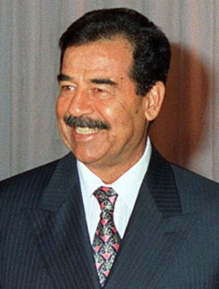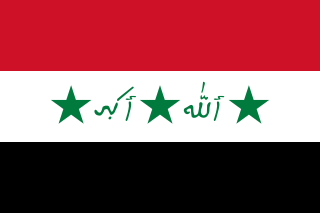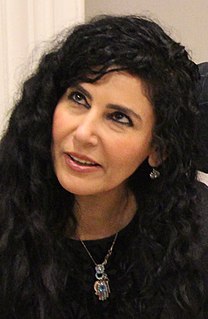
Saddam Hussein Abd al-Majid al-Tikriti was an Iraqi politician who served as the fifth president of Iraq from 16 July 1979 until 9 April 2003. A leading member of the revolutionary Arab Socialist Ba'ath Party, and later, the Baghdad-based Ba'ath Party and its regional organization, the Iraqi Ba'ath Party—which espoused Ba'athism, a mix of Arab nationalism and Arab socialism—Saddam played a key role in the 1968 coup that brought the party to power in Iraq.

After the 2003 invasion of Iraq, evidence began to emerge of failed attempts by the Iraqi government to bring the conflict to a peaceful resolution.
James Martin Fenton is an English poet, journalist and literary critic. He is a former Oxford Professor of Poetry.
The poetry of South Africa covers a broad range of themes, forms and styles. This article discusses the context that contemporary poets have come from and identifies the major poets of South Africa, their works and influence.
Saddam Hussein and al-Qaeda link allegations were made by the U.S. government officials who claimed that a highly secretive relationship existed between Iraqi President Saddam Hussein and the radical Islamist militant organization Al-Qaeda between 1992 and 2003, specifically through a series of meetings reportedly involving the Iraqi Intelligence Service (IIS). In the lead up to the Iraq War, George W. Bush administration officials alleged that the Saddam Hussein regime had an operational relationship with al-Qaeda, basing the administration's rationale for war, in part, on this allegation and others.

Abd al-Wahhab al-Bayati was an Iraqi Arab poet. He was a pioneer in his field and defied conventional forms of poetry that had been common for centuries.
Kanan Makiya is an Iraqi-American academic and a professor of Islamic and Middle Eastern Studies at Brandeis University. He gained international attention writing the 1989 book Republic of Fear, which became a best-seller after Saddam Hussein's invasion of Kuwait, and Cruelty and Silence (1991), a critique of the Arab intelligentsia. Makiya would later lobby the U.S. government to invade Iraq in 2003 in order to oust Hussein's regime.
Nabīl or Nabeel is a male given name of Arabic origin, meaning "noble". The feminine version is Nabila, Nabeela, Nabilah, Nabseela or Nabeelah. The name Nabil has a similar meaning to the English given name Patrick.
Men and the City is a 320-page novel by former Iraqi leader Saddam Hussein which was published in 2002. The work was largely autobiographical in nature and describes how Saddam Hussein's grandfather fought the Turks during the Ottoman Empire. It also focuses on the rise of the Ba'ath Party and several of Saddam's relatives including his uncle. It was the third work which Saddam published. The hero of the novel is a character named Saleh but it is widely assumed that the novel is a thinly veiled autobiography of Saddam himself.
The cinema of Iraq went through a downturn under Saddam Hussein's regime. The development of film and film-going in Iraq reflects the drastic historical shifts that Iraq has experienced in the 20th century. The Iraq War which began in 2003 had an influence on many films being produced.

Hardan ’Abdul Ghaffar al-Tikriti was a senior Iraqi Air Force commander, Iraqi politician and ambassador who was assassinated on the orders of Saddam Hussein. Additionally he held the titles of vice chairman of the Iraqi Revolutionary Command Council and vice president of Iraq.
Jalal Barzanji is a contemporary Kurdish poet and writer.

Jamil Sidqi al-Zahawi was a prominent Iraqi poet and philosopher. He is regarded as one of the greatest contemporary poets of the Arab world and was known for his defence of women's rights.

Ali Bader is an Iraqi novelist, poet, poetry translator, critic, regarded as the most significant writer to emerge in Arabic world, in the last decade. author of fifteen works of fiction, and several works of non-fiction. His best-known works include Papa Sartre, The Tobacco Keeper, The Running after the Wolves, and The Sinful Woman, several of which have won awards. His novels are quite unlike any other fictions in Arabic world of our day, as they blend character study, social criticism, philosophical reflection, and explicit language. Bader was born in Baghdad, where he studied western philosophy and French literature. He now lives in Brussels. In addition to his work as an author, he is also journalist. He is working as Editor-in-Chief of Eurolitkrant an interdisciplinary and literary journal. https://eurolitkrant.com/IndexEn.aspx.

Ba'athist Iraq, formally the Iraqi Republic until 6 January 1992 and the Republic of Iraq thereafter, covers the national history of Iraq between 1968 and 2003, during the period of the Arab Socialist Ba'ath Party's rule. This period began with high economic growth and soaring prosperity, but ended with Iraq facing social, political, and economic stagnation. The average annual income decreased both because of external factors and the internal policies of the government.

Iraqi nationalism is a form of nationalism which asserts the belief that Iraqis are a nation and promotes the cultural unity of Iraqis, of ethnoreligious groups such as Arabs, Kurds, Turkmens, Assyrians, Chaldeans, Yazidis, Mandeans, Shabaks, Kawliya, Dom, Yarsans, and others. Iraqi nationalism involves the recognition of an Iraqi identity stemming from ancient Mesopotamia including its civilizations of Sumer, Akkad, Babylonia and Assyria. Iraqi nationalism influenced Iraq's movement for independence from Ottoman and British occupation. Iraqi nationalism was an important factor in the 1920 Revolution against British occupation, and the 1958 Revolution against the British-installed Hashemite monarchy.
Muhammad Afifi Matar, was an Egyptian poet. He was born in the village of Ramalat al-Anjab in the Menoufia region of the Nile Delta. He went to school in Menouf and afterwards moved to Cairo where he studied philosophy at Ain Shams University.
Nabeel Yasin is an Iraqi poet, journalist and political activist.
The Tulfah family was the family of Saddam Hussein of Ba'athist Iraq who ruled from 1979 to 2003 and established a single party authoritarian government under the control of the Ba'ath Party until the invasion by US/UK forces in 2003.

Amal Al-Jubouri is an Iraqi writer, poet, translator, journalist and publisher.








